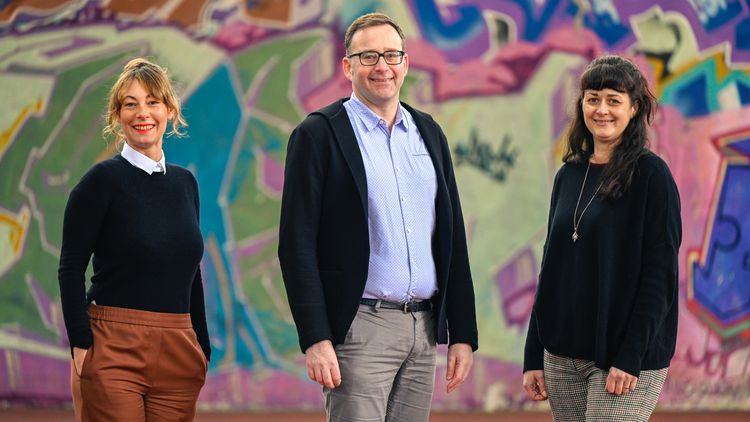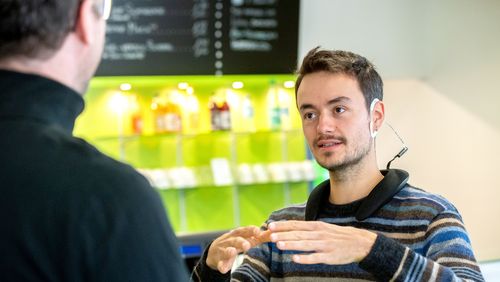The graduate schools 3GO and OLTECH are an important resource for doctoral students. They provide important skills and support cooperation, exchange and joint activities.
Going on to gain further academic qualifications after completing undergraduate studies is a matter of course for most PhD students at the University of Oldenburg. Many of them are members of one of the university's two graduate schools. They attend lectures, conferences and seminars, and in many cases also continue to collect credit points, as they did during their undergraduate studies.
"With these programmes and courses, we help our doctoral students to complete their doctoral degrees successfully and within an appropriate timeframe, and we prepare them for their professional career," explains Prof. Dr. Thorsten Dittmar, Director of the Graduate School Science, Medicine and Technology (OLTECH). Institutions like OLTECH are playing an increasingly important role.
The idea behind the graduate schools began to develop at the beginning of the 2000s, when in the wake of the Bologna reforms it became clear that there were advantages to involving more people and resources in the PhD qualification process. "Many doctorates were taking a very long time, and the dropout rate was high," explains Christine Steinseifer-Jeske. "This is where we offer support with our programmes." Together with Dr Ferdinand Esser, Steinseifer-Jeske is managing director and coordinator of the OLTECH graduate school, which was founded in 2009 and is open to PhD students in the natural sciences, medicine and computer science.
In 2011, the university established a second institution, the Graduate School for Social Sciences and Humanities (3GO), which supports PhD students from Faculties I, III and IV and the Department of Business Administration, Economics and Law. Explaining the tasks of the two institutions, Rea Kodalle, managing director and coordinator of the 3GO says: "We offer services such as workshops on various topics and counselling in difficult situations." In addition, she and her team advise researchers when they apply for early career research funding in the context of larger projects and also work closely with the coordinators of the individual PhD programmes.
In principle, all doctoral students at the university can take advantage of the graduate schools' programmes and services. At 3GO, students need only apply for informal membership. At OLTECH, students must either officially enrol in a doctoral study programme or take part in a "structured PhD programme".
Working toward a PhD with team spirit
The courses offered by the graduate schools range from workshops on good scientific practice to introductory courses on specific software or training in transdisciplinary skills. 3GO and OLTECH each offer 20 to 30 courses per year, with most doctoral students taking one workshop per semester on average. Students can also receive credits for activities that are a standard part of working for a doctoral degree, such as attending conferences or supervising a Bachelor's or Master's thesis.
"The workshops on time management and scientific writing were the highlights for me," says Christopher Dibke, who is doing his PhD at the Institute for Chemistry and Biology of the Marine Environment. Katharina Gärtner, a student in the PhD programme Environmental Economics and Sustainability Management, says she particularly enjoyed the courses on publishing and the programming language Python. "The seminar on science management, where we learned about different career options after completing a doctorate was also interesting," she adds.
Marine ecologist Tabea Hildebrand found the annual Doctoral Students' Days organized by the two graduate schools together with the Graduate Academy particularly helpful. Comprising lectures, discussion groups and individual consultations, the events were always inspiring, she says: "Because I'm doing my doctorate at the Helmholtz Institute for Functional Marine Biodiversity and am rarely physically present in my research groups at the university, I found it very helpful to exchange ideas with others on these occasions."
A modern approach to supporting early career researchers
Networking is another important advantage of the graduate schools, as Ferdinand Esser points out: "They give doctoral students the opportunity to connect across disciplinary boundaries." The students also receive expert support from the lecturers, says Rea Kodalle: "It's much easier to explore the advantages and disadvantages of a new method in conversation with others than to learn about them by reading a book on your own." Both graduate schools frequently recruit lecturers from the university, who can thus pass on their expertise beyond their own research groups.
Currently, just under half of the university's roughly 1,200 doctoral students are taking advantage of the graduate schools' programmes. Thorsten Dittmar would like that figure to grow: "We want to significantly increase our enrolment numbers," he says. The OLTECH team is counting on transparent quality management and an even broader range of workshops to further enhance its programmes and infrastructure. "The two graduate schools have worked very well together since their establishment, and benefit from each other's different experiences and courses," emphasizes Prof. Dr. Gisela Schulze, Director of the 3GO. "They thus contribute significantly to providing a modern form of support for early career researchers – and scholarship sponsors are also taking note of this."
PhD students also appreciate this targeted support, which allows them to conduct independent research without being left alone to fend for themselves. "A major advantage is that a team spirit develops which motivates students to work together in depth in a given field of research," says Christopher Dibke. He hopes that this team spirit will endure even after students complete their doctorates.
This text first appeared in UNI INFO 1/2022.






